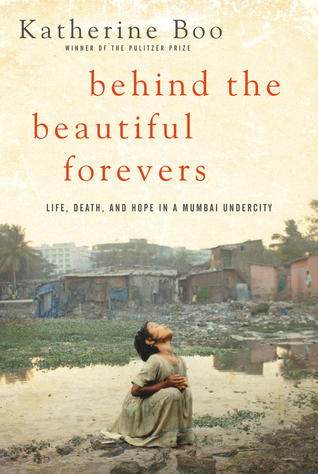As I was finishing the book, I started to think that living what I consider an ethical life is perhaps a luxury. Here I am at what I call an underpaid job, yet without stealing, cheating, or even without taking a job I find to be the slightest bit ethically troubling, I can live in the neighborhood I want, go out to eat several times a week, buy organic food and fresh produce, go on trips abroad, buy new clothes, fix my car, all without batting an eye. There is no meaningful sacrifice in lifestyle for my self-righteous decision to take the moral high ground. What would I be willing to do if it meant the difference between starving and eating well? Between being covered with worms and lice and rat bites or living in a safe and comfortable space? Or, unimaginable to me, even with no children of my own--what would I be willing to do to prevent seeing my children suffer the same? The willingness to walk past a beggar dying in the street, to divert funds intended for school children, to extort money from my even poorer neighbor, and the unwillingness to leave work or risk police displeasure to help a severely burned woman to the hospital, suddenly become less unthinkable.
When tragedy arises or human evil erupts, the tendency is to stare, shocked, and ask--how does one become so evil?--congratulating oneself on being more righteous. I do it all the time. It largely starts with "I don't understand how someone could. . . "
It sounds almost like I'm trying to understand it--almost. But I'm not really, not at all. I'm seeking comfort in essential differences between me and them: They are something other, something monster--I am something moral, rational, good. But over the course of my life (even as sheltered and narrow as it has been), when immoral acts are observed from close proximity, this otherness is never there. Cruelty springs from circumstances that compound to create an environment where it ceases to be an incomprehensible evil act in a vacuum, and it suddenly becomes--horribly, terrifyingly--very plausible, if not justified. The father who beats and intimidates his daughter, the student who sells drugs and joins a gang-- these are not the acts of someone living in perfect peace with an obscene desire to wreak destruction on the world, but are choices made in fear, pain, and desperation--from a lifetime of being treated similarly so it becomes normal, where it ceases to feel like a choice. And of course we all daily make immoral choices that seem to us to be normal and justifiable, perhaps because of their smaller scale or less immediately visible consequences. I tell stories sometimes to make myself look better, but try to make it seem like I'm doing it modestly--I feel myself creating this fiction but I'm almost powerless to stop it. It's a deception meant to increase my likableness, and is inherently self-serving. Or I have a habit of just buying new stuff when old stuff starts to get old because I'm too lazy to repair it, or I don't take care of things well. End result=increased pollution, animals losing habitats as I consume more, children in Bangladeshi sweat shops producing my stuff, exploited miners in Africa pulling materials for me out of the dust. But that last sentence almost sounds like I'm so virtuous that I have to reserve my guilt for vague first-world consumerist unease--another case of me trying to make myself look good and be modest about it at the same time.
Beyond the casual selfishness, there are the more vindictive, mean moments--I'll say something to make myself come off as slightly superior to a friend, or I'll bask in the smugness of knowing an acquaintance said something backward, or feel a bit better about myself professionally because of a colleague's failure. And here I am with no pressing need and a life of luxury by any general world standard--I just want to be the most important, the best, your favorite, the most beloved.
